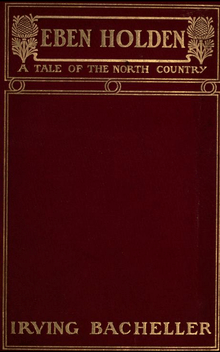Eben Holden
 First edition cover | |
| Author | Irving Bacheller |
|---|---|
| Country | United States |
| Language | English |
| Genre | Novel |
| Publisher | Lothrop Publishing Company |
Publication date | July 2, 1900 |
| Media type | Print (hardcover) |
| Pages | 432 pp |
Eben Holden: A Tale of the North Country is a 1900 novel by Irving Bacheller. It was a popular book at the time of its release, among the top 10 bestselling books in the United States in both 1900 and 1901. The book is set in the North Country region of New York.
Publication
Bacheller's first draft of the novel was meant for children, which he submitted to St. Nicholas Magazine and other publications, which all rejected it.[1] When David Harum (1898) became a big success, he revised it in a similar mold. It was released by Lothrop Publishing Company on July 2, 1900. It found immediate popularity, reportedly selling 125,000 copies in the first four months of release.[2] For the February and March 1901 issues of The Bookman, it tied with Alice of Old Vincennes as the best-selling book in the United States.[3][4] As a result, some modern references refer to the novel as the "first best-selling novel of the 20th century."[5]
A "dramatic edition" of the novel was released in 1901 with seven photographs of the play based on the novel, and an author portrait.[6] In 1903, twelve photographs by Clarence Hudson White were included in a "de luxe" edition of the novel.
A 1956 article by literary scholar Walter Harding noted that while the book had fallen far out of popularity by then (the copy he reviewed had last been checked out of the library in 1931), "one was not well-read in 1900 unless he had read Eben Holden." While he opined that "its sentimentality borders on the laughable ... its melodrama is impossible [and] its language is deplorable," he concluded that "despite all this, it is still surprisingly readable."[2]
Bacheller's slim volume, Eben Holden's Last Day A-Fishing, was published in 1907.[7]
Adaptations
Edward Everett Rose was commissioned to adapt the novel into a play, which had its Broadway debut on October 28, 1901 at the New Savoy Theatre, managed by Charles Frohman, and with Edmund Milton Holland playing the title role. It played through December 14 before going on tour.[8][9][10][11]
Legacy
Bacheller graduated from St. Lawrence University in 1882, and later served on its board of trustees. The University's English honor society is called The Irving Bacheller Society, and all inductees receive a copy of Eben Holden. Eben Holden is also the name of a campus building.[12][13][5][14]
References
- ↑ Harkins, E.F. (July 1903). Little Pilgrimage Among the Men Who Have Written Famous Books, The Literary World
- 1 2 Harding, Walter. Eben Holden (retrospective review), in The Georgia Review (Vol. 10, No.2, Summer 1956, pp. 240-43)
- ↑ (January 1902). Popular Fiction of 1901, The Bookman, pp. 454-55
- ↑ Maurice, Arthur Bartlett (November 1900). Irving Bacheller's "Eben Holden" (review), The Bookman, Vol. 12, No. 3, pp. 235-37 ("At the beginning of this review the writer wishes to say that Mr. Bacheller's book seems to have been very strongly suggested by David Harum. Once this is pointed out there is nothing else that demands serious adverse criticism ...")
- 1 2 (18 May 2014). Honor Societies Induct Newest Members, stlawu.edu, Retrieved 4 January 2016
- ↑ (January 1902). The Lothrop Publishing Company, The Bookseller
- ↑ (10 October 1907). The Latest Books, Life
- ↑ (29 October 1901). "Eben Holden" at the Savoy, The New York Times
- ↑ (11 March 1902). Return of Eben Holden, The New York Times
- ↑ (28 October 1901). Advertisement (for opening night of play), The World
- ↑ (14 December 1901). Advertisement (for closing night of play), The World
- ↑ (7 April 2005). NetNews, St. Lawrence University, Retrieved 4 January 2016
- ↑ Eben Holden, stlawu.edu, Retrieved 4 January 2016)
- ↑ St. Lawrence University Bulletin, p. 23 (1966) ("Eben Holden Hall contains a lounge and a dining area seating 410.")
External links
- Fully book via Google Books.
- An Audio Novel: Eben Holden: Tale of the North Country via North Country Public Radio
- Eben Holden at the Internet Broadway Database